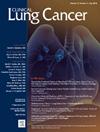Brief Report: Osimertinib Plus Capmatinib for Patients With MET-Altered EGFR-Mutant NSCLC Following Progression on Front Line Therapy
IF 3.3
3区 医学
Q2 ONCOLOGY
引用次数: 0
Abstract
- •Osimertinib, a third generation EGFR TKI, has become the standard-of-care treatment for patients with classical sensitizing EGFR mutations and has significantly improved survival in these patients.
- •Alterations in the MET tyrosine kinase pathway is one of the most common drivers of resistance to EGFR TKIs.
- •Multiple early-phase studies have investigated dual EGFR/MET inhibition for EGFR mutant patients with MET amplification in the second-line setting after progression on osimertinib however real world data is limited.
- •We report a case series of 18 patients with MET amplification/overexpression treated with combination capmatinib/osimertinib after progression of first line osimertinib.
- •Most patients with combination capmatinib and osimertinib had clinical benefit and treatment was generally well tolerated.
- •Cap/osi is an effective and reasonably well tolerated treatment for osimertinib-resistant EGFR-mutant NSCLC with MET alteration. Further work is needed to optimize biomarker assessment to appropriately identify patients who will benefit from this strategy.
简要报告:奥西替尼加卡马替尼治疗met改变的egfr突变NSCLC患者在前线治疗进展。
•奥西替尼是第三代EGFR TKI,已成为经典致敏性EGFR突变患者的标准治疗方法,并显著提高了这些患者的生存率。•MET酪氨酸激酶途径的改变是EGFR TKIs耐药的最常见驱动因素之一。•多个早期研究已经调查了在奥西替尼进展后二线环境中MET扩增的EGFR突变患者的EGFR/MET双重抑制,但现实世界的数据有限。•我们报告了18例MET扩增/过表达患者在一线奥西替尼进展后联合卡马替尼/奥西替尼治疗的病例系列。•大多数联合使用卡马替尼和奥西替尼的患者有临床获益,治疗通常耐受性良好。•Cap/osi是一种有效且耐受性良好的治疗奥西替尼耐药egfr突变NSCLC伴MET改变的方法。需要进一步的工作来优化生物标志物评估,以适当地识别将从该策略中受益的患者。
本文章由计算机程序翻译,如有差异,请以英文原文为准。
求助全文
约1分钟内获得全文
求助全文
来源期刊

Clinical lung cancer
医学-肿瘤学
CiteScore
7.00
自引率
2.80%
发文量
159
审稿时长
24 days
期刊介绍:
Clinical Lung Cancer is a peer-reviewed bimonthly journal that publishes original articles describing various aspects of clinical and translational research of lung cancer. Clinical Lung Cancer is devoted to articles on detection, diagnosis, prevention, and treatment of lung cancer. The main emphasis is on recent scientific developments in all areas related to lung cancer. Specific areas of interest include clinical research and mechanistic approaches; drug sensitivity and resistance; gene and antisense therapy; pathology, markers, and prognostic indicators; chemoprevention strategies; multimodality therapy; and integration of various approaches.
 求助内容:
求助内容: 应助结果提醒方式:
应助结果提醒方式:


